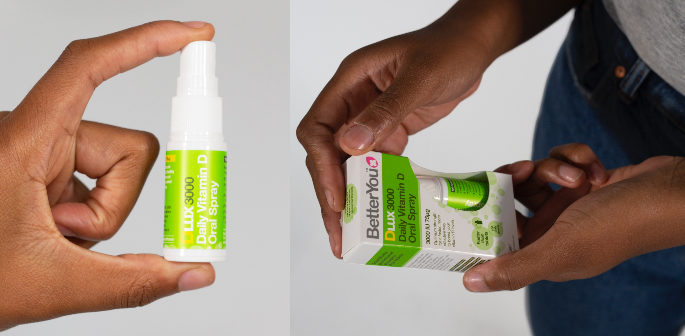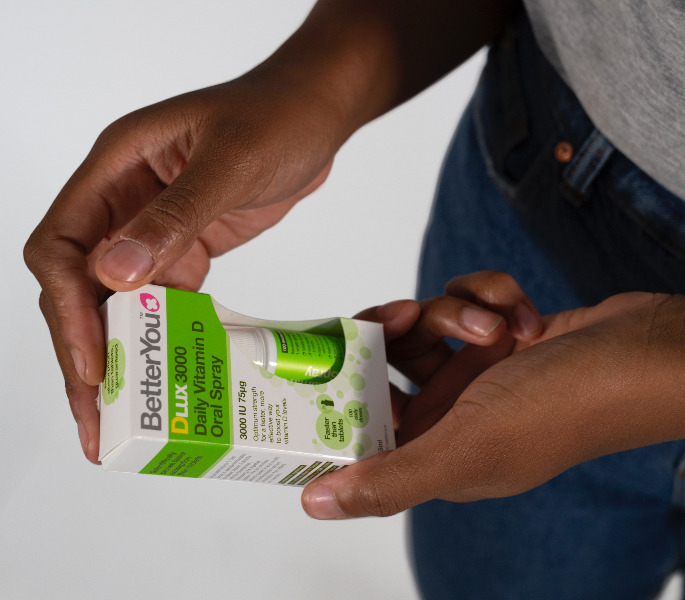"Deficiency is prevalent in those with darker skin"
The importance of vitamin D is paramount in the body as it helps keep teeth, bones and muscles healthy. However, having to stay indoors during the lockdown can affect the level of vitamin D in your body.
This is because we are not getting enough of it from sunlight which can negatively impact our health.
A lack of vitamin D in children can lead to bone deformities like rickets while in adults, conditions such as osteomalacia can cause bone pain.
In particular, those from South Asian and ethnically black backgrounds are more susceptible to vitamin D deficiency.
DESIblitz exclusively spoke to Nutritional Expert and Product Developer at BetterYou, Keeley Berry, to ask about the importance of it in the body, vital food supplements and much more.
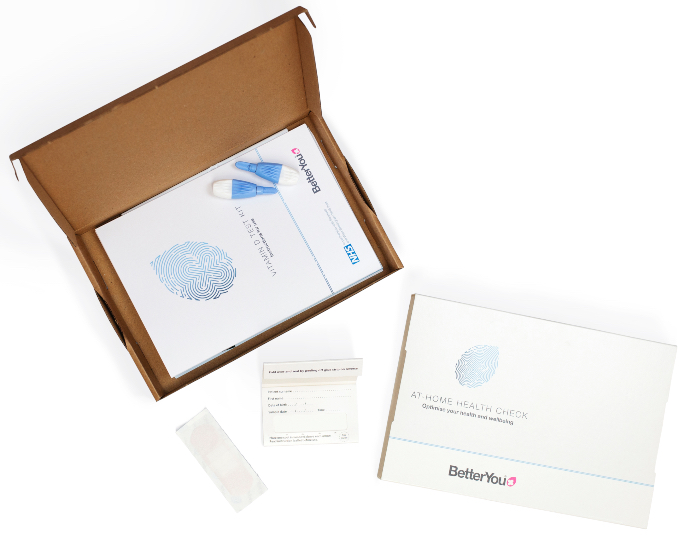
Please explain what vitamin D does for the body.
Supporting a normal, effective immune system and keeping our bones, muscles and teeth healthy, vitamin D is an essential nutrient.
It regulates the intake of calcium, magnesium and phosphorous. These are some of the vital minerals required for the formation of strong, healthy bones.
Otherwise known as the ‘sunshine vitamin’ 80-90 per cent of our vitamin D stores are provided by the sun. Its UVB rays stimulate its production in our skin.
For those living in the northern hemisphere, the amount of UVB radiation in Autumn and Winter is not sufficient enough to produce the amount our bodies need.
So, it’s essential to maintain healthy levels through diet and supplementation.
What happens if a person is very deficient?
Vitamin D deficiency remains a worldwide issue with around 1 billion people across the globe experiencing inadequate levels.
The National Institute for Health and Care Excellence (NICE) suggests that around 10 million people in the UK alone could be at risk of deficiency.
Vitamin D deficiencies can present many symptoms. They are often indications that are attributed to other illness or lifestyle factors and can, therefore, go undiagnosed.
These symptoms include; catching frequent coughs and colds, muscle stiffness, soreness or bone ache, headaches, fatigue and even low mood.
Severe deficiencies can lead to loss of bone density and deformities, such as rickets in children and bone pain or osteomalacia (softening of the bones) in adults.
A lack of vitamin D will contribute to the softening of the bones. This can lead to bowing of the legs in children and adults may see an increase in bone fractures.
Low levels have also been linked to anxiety and depression. The vitamin D receptors appear in a number of different brain tissues and contribute to nerve formation.
Importantly, these receptors are found in areas of the brain that control mood.
What’s more, research suggests that vitamin D may help to modulate levels of neurotransmitters.
For example, serotonin (the happy hormone) within the brain, plays a pivotal role in the development of depression.
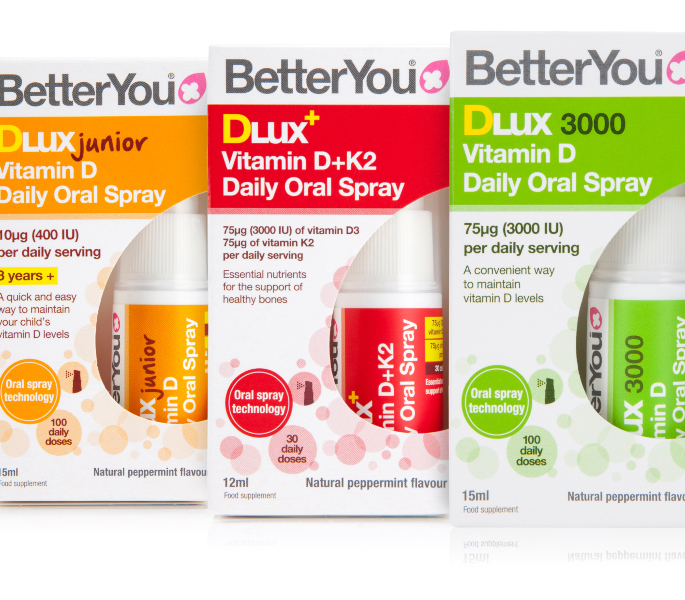
Which age groups are affected most?
Public Health England acknowledges infants and the elderly as at-risk of deficiency.
But it is also widely recognised that children, teenagers, pregnant and breastfeeding women may be more likely to suffer suboptimal levels.
“Lifestyle factors can also affect a person’s blood serum levels of the nutrient.”
For example, those following a plant-based diet (who may not be able to obtain vitamin D through their foods) or people leading very indoor lifestyles such as care home residents and office or shift workers.
So, it’s important to test your levels if you show consistent symptoms and fall into one of the more affected categories.

Are British South Asian communities more at risk?
The amount of vitamin D that is produced by the body from sunlight depends on the time of day, where you live and the colour of your skin.
The Department of Health and Social Care recommends that those with darker skin, for example, if you have an African, African Caribbean or South Asian background, consider taking a supplement throughout the year as you may be at higher risk of vitamin D deficiency.
Deficiency is prevalent in those with darker skin as they have a natural barrier towards the UVB rays needed to penetrate the skin. This natural barrier comes in the form of melanin.
Melanin is the term used for a group of natural pigments. These affect how light or dark your skin colour is. The more melanin you have, the darker your skin colour.
This melanin competes with vitamin D in the skin for UVB absorption. This means that darker skin types allow less UVB to enter the skin and consequently produce less vitamin D.
Add to this, the fact that research indicates Asian ethnicity is associated with reduced intestinal permeability (the intestines’ ability to allow nutrients to pass through the gut).
It is clear that ethnicity should be a consideration when addressing vitamin D intake.
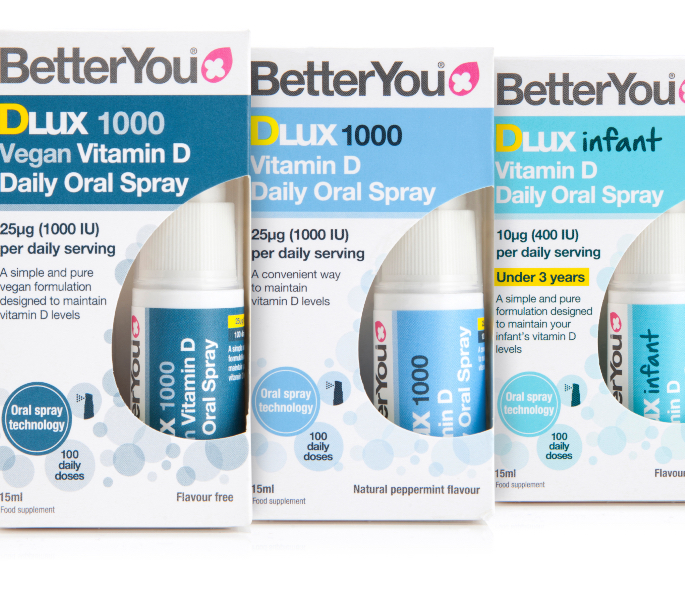
What foods and supplements are ideal boosters for vitamin D?
The only foods which provide vitamin D at a meaningful level are eggs (but only from hens that are fed vitamin D) and fatty fish such as mackerel and herring.
Some foods are also fortified with vitamin D such as some cereals, orange juice, soy milk and some dairy products.
For vegans and vegetarians that prefer not to consume animal products, a daily supplement is recommended to bridge the nutrient gap.
For many people, such as those with dysphagia, using traditional methods of supplementation can be challenging.
In particular, [it can be challenging] for children and older adults who may struggle to swallow tablets or capsules.
“Pill-free supplementation, such as BetterYou’s DLux Vitamin D Oral Spray range, provides an effective alternative to traditional tablets and capsules.”
An oral spray delivers nutrients to the bloodstream via the buccal membrane of the inner cheek. It offers a convenient supplementation solution.
This is also essential for those that have conditions such as IBS, Crohn’s, Colitis and coeliac disease. The amount of nutrients the body can absorb through the gut may be suboptimal.
A 2019 study conducted by Sheffield University, in conjunction with BetterYou, found oral sprays to be just as effective at elevating levels as traditional capsules.
In the trial, of those presenting lower baseline levels of vitamin D, levels were deemed to be replete after just 21 days of supplementation using BetterYou’s DLux 3000 Vitamin D Oral Spray.
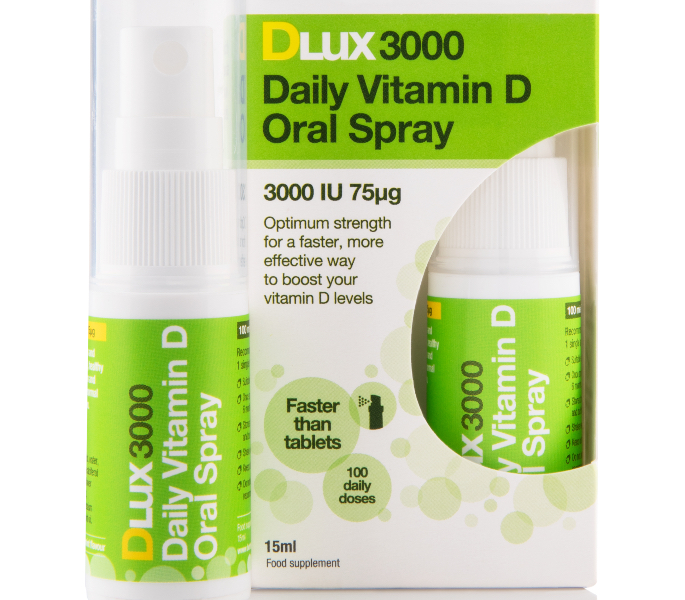
Amid the coronavirus lockdown, it is imperative to ensure vitamin D levels are kept in check to avoid any associated health worries.
In this instance, you must ensure measures are taken to boost vitamin D levels such as eating foods which provide this soluble.
Alternatively, try oral sprays such as the BetterYou’s DLux 3000 Vitamin D Oral Spray which has been proven to help boost production.




















































